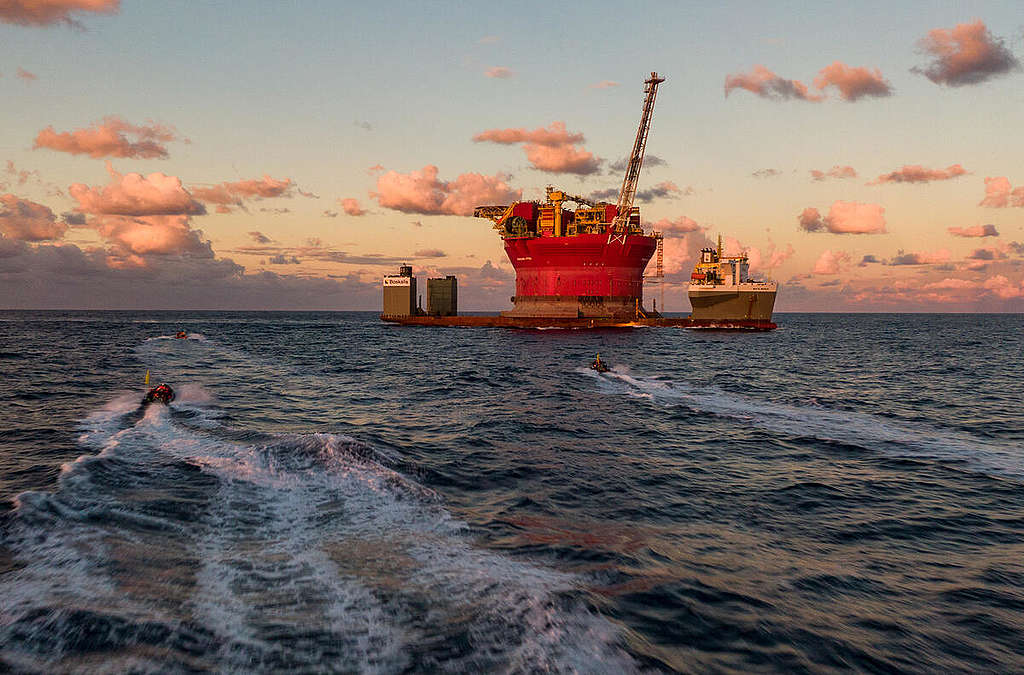 Greenpeace activists approach Shell oil platform in Atlantic Ocean north of the Canary Islands © Chris J Ratcliffe / Greenpeace
Greenpeace activists approach Shell oil platform in Atlantic Ocean north of the Canary Islands © Chris J Ratcliffe / GreenpeaceThis picture represents the emotions I felt while standing on the Greenpeace ship, the Arctic Sunrise, watching the peaceful protest unfold. This was my very first action at sea, so yes, you got it right, I was scared! But at the same time excited about why I was there in the first place.
This ‘red monster’ whose sheer weight of 31,000 tonnes betrays the arrogance of Shell – no hiding away and full impunity. This is a floating production storage and offloading [FPSO] unit for a redevelopment project located northeast of the Shetland Islands in the UK, where it is headed. Shell seeks to squeeze every last drop of oil from the Penguins field and the production platform is the first new manned vessel for this big polluter in the North Sea for 30 years. It will enable Shell to pump out the equivalent of more than 100 million barrels of oil up to 2044. This means Shell will be contributing towards prolonging the fossil fuel age, worsening the climate crisis which is leading to a ripple effect of death, destruction, displacement and overall misery around the world.
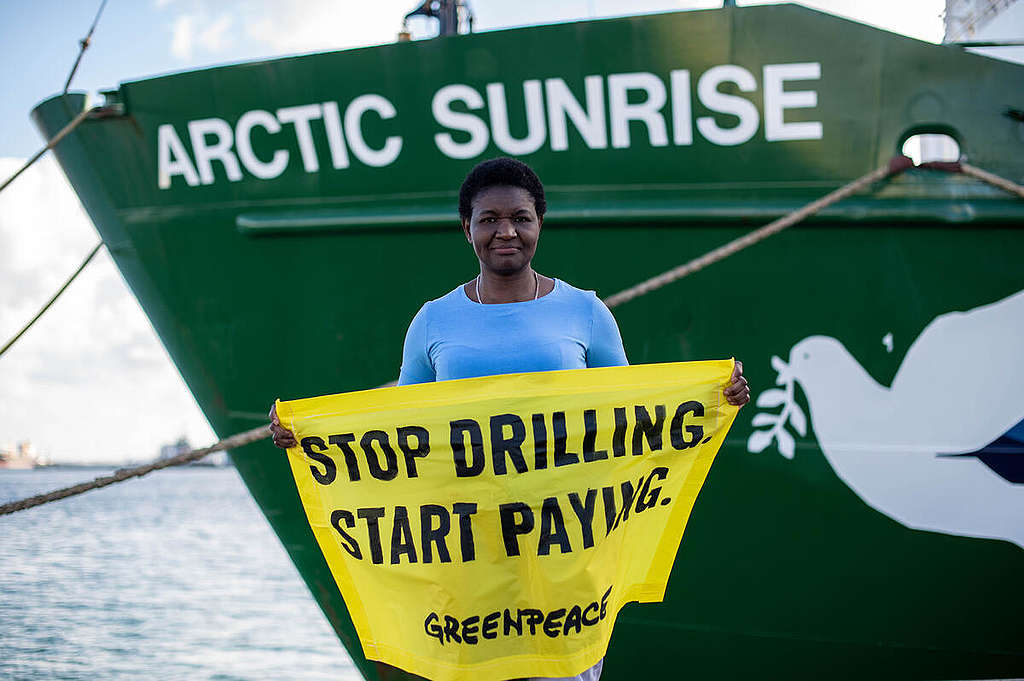 Victorine Che Thöner, spokesperson from Germany and originally from Cameroon in Las Palmas, Gran Canaria. Victorine is holding a hand banner that reads ‘Stop Drilling. Start Paying.’ © Chris J Ratcliffe / Greenpeace
Victorine Che Thöner, spokesperson from Germany and originally from Cameroon in Las Palmas, Gran Canaria. Victorine is holding a hand banner that reads ‘Stop Drilling. Start Paying.’ © Chris J Ratcliffe / GreenpeaceLooking at the dire state in which we find ourselves now because of the climate crisis, climate justice must be served. I find it so shocking that in spite of us being in this climate crisis, these companies are still going ahead with extraction. Most of all, profiteering from this is more important to them than protecting the planet. Shell and the wider fossil fuel industry must take responsibility and be held accountable for the consequences of their decisions. There should be no more convincing here with the demand for them to shift their focus towards a speedy and equitable transition to clean and affordable energy.
Fossil fuel oppression
Fossil fuel extraction and its consequences are a huge problem we face, as embodied in this infrastructure, boldly riding out into the world, with support from the same governments that should be protecting its citizens and the planet, giving it undeserved power. This floating ‘red monster’ symbolises the huge fight we have ahead of us against fossil fueled oppression.
But most of all, this is the final straw for most, especially those who will be impacted by what this platform stands for: action needs to be taken now! This also symbolises the need to strengthen connections with fighting communities, especially women, so together we can break free from fossil fuel dictatorships. And this is that action happening.
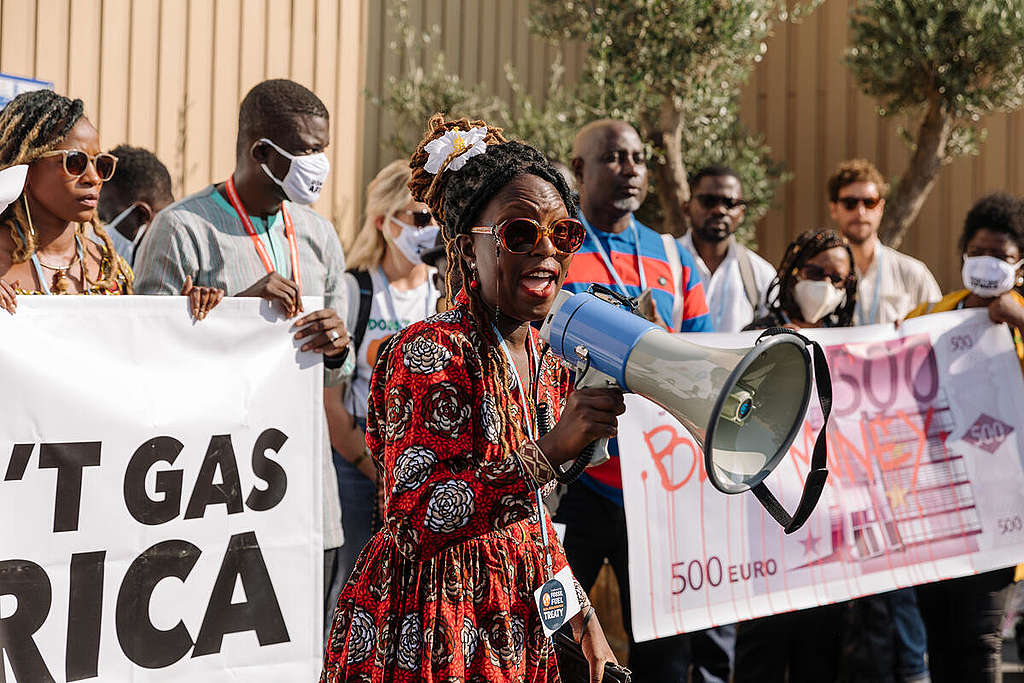 Don’t Gas Africa Event during COP27. Campaigners call for an end to fossil-fuel-induced energy apartheid in Africa and ask to scale up cost-effective, clean, decentralized, renewable energy to end energy exclusion and meet the needs of Africa’s people. © Marie Jacquemin / Greenpeace
Don’t Gas Africa Event during COP27. Campaigners call for an end to fossil-fuel-induced energy apartheid in Africa and ask to scale up cost-effective, clean, decentralized, renewable energy to end energy exclusion and meet the needs of Africa’s people. © Marie Jacquemin / GreenpeacePeople around the world are risking it all to resist fossil fuel destruction and bring their collective demands directly to governments and companies. The demands are simple and sensible. We need to end our addiction to fossil fuels once and for all. The pathway to a new energy system that is accessible and affordable for all and good for our climate must happen. There should be no further expansion and extraction of fossil fuels. Fossil fuel companies have to pay for the loss and damage due to climate impacts linked to their historical and present emissions. In addition, these companies must engage in a speedy and just transition to clean and affordable energy.
As I stood there, on the bridge of the Arctic Sunrise, a Cameroonian-born woman in the middle of the North Sea, there was so much to mull over. I was feeling weak from sea sickness and I was thinking of the stories I had heard about the savagery of these waters, and how cold it could get. Looking down at how the waves were churning and hitting against the ship, my apprehension only grew. But I did find peace in looking at the activity around me – the brave activists preparing themselves for the climb onto the red monster. The peace within me grew because I felt like I was finally doing what was right, to publicly show my support for the demands of impacted communities, women and youth across the world. I kept thinking: your courage and resistance has made it possible for me, Victorine, to be here and I am standing with you now shouting out your demands.
I also felt that I played a part in making people understand the destruction that fossil fuel extraction causes. It is important for me to build bridges between us in our world. People need to understand that this destruction is not only happening where extraction takes place, but it is global. However, it is important that we acknowledge that the impacts are felt disproportionately in different parts of the world. Also, resources and support available to build back are not the same.
Standing for climate justice
On the Greenpeace ship, I felt like I was part of making people understand what it really means to call for climate justice. During this action, I was so busy giving interviews to journalists and posting on social media. I did this to communicate with fossil fuel companies, demanding they stop drilling and start paying for the destruction caused by extreme weather events, which are becoming more frequent and severe due to climate change. I was part of a movement holding these polluting profiteers responsible for their actions.
At that moment, I felt awakened, alive, invigorated and most of all, I felt relevant in this struggle for a better, safer, cleaner and fairer future. This of course also includes that future where policies are dictated by the needs of people and planet, not the greed of polluters.
When I see the suffering of impacted people, I feel angry. Angry because these are disasters that could have been averted, had greed not blinded fossil fuel companies. Governments could also have easily averted these disasters if they had stepped in to support their citizens by adopting and implementing policies that protect people and the planet. The worst part is that impacted communities and countries don’t have the support they need, despite there being so much money in the world. I am reminded here of the many victims of floods and landslides in my homeland Cameroon. Communities getting no support for homes, crops, livelihoods and lives lost. Who can they even turn to? They are on their own.
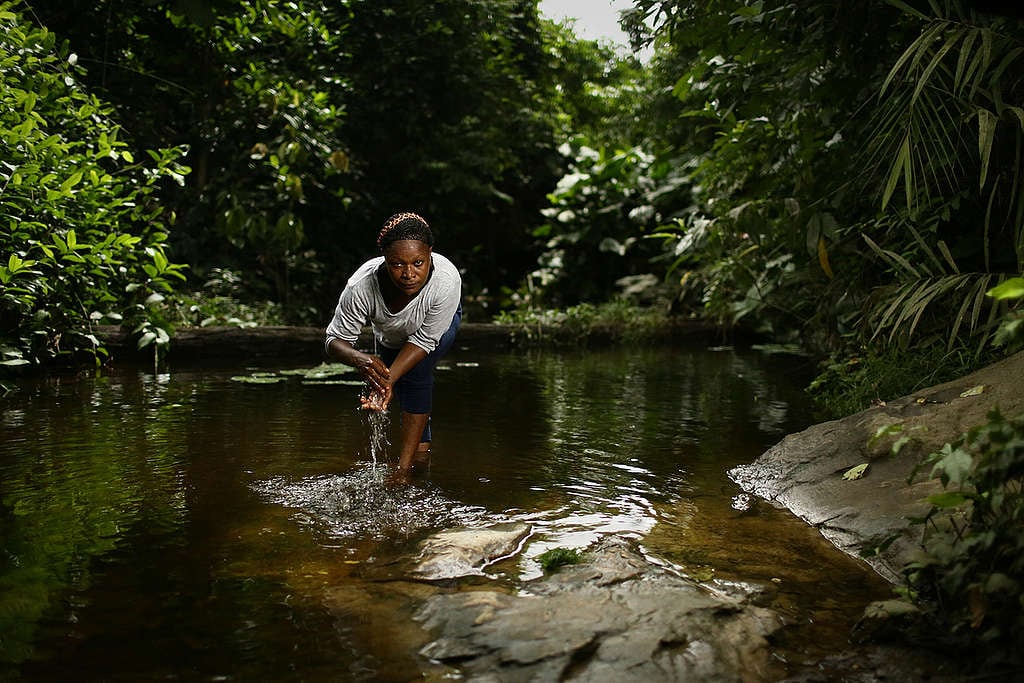 Solange Sanhgan, 29 yrs old, a leader of the Bagyeli Pygmy community in South Cameroon who are fighting for their rights against Socapalm (Société Camerounaise de Palmeraies) and uncontrolled expansion of palm oil and rubber operations. © Micha Patault / Greenpeace © Micha Patault / Greenpeace
Solange Sanhgan, 29 yrs old, a leader of the Bagyeli Pygmy community in South Cameroon who are fighting for their rights against Socapalm (Société Camerounaise de Palmeraies) and uncontrolled expansion of palm oil and rubber operations. © Micha Patault / Greenpeace © Micha Patault / GreenpeaceI feel worried too, because this ugly red monster platform is a clear message that Shell intends to continue drilling for oil and gas. The consequence of this is that the suffering and pain from climate change induced impacts will continue into the future, affecting future generations who are not responsible for the causes of climate change. My apprehension grows as I think of my children and even their children who will bear the brunt of this crisis without having done anything to cause it. I cannot help but think of what awaits them, but most of all the fact that I will not even be there to fight with them.
Connection to the movement
My feelings thankfully are not all negative, as also I feel elated, seeing so many communities, especially women and youth, standing up to draw their own pathway to their wellbeing and dignity. It is also very uplifting seeing growing support around the world for a speedy transition towards affordable and reliable energy that is also good for the planet. This will hopefully move us away from reliance on fossil fuels.
The photograph of the ‘red monster’ is not just a picture. It tells a whole story of the problems we are facing because of the greed of a few. But most of all, it tells a story of the courage and strength of many to take action for a just and fair world. In this reflection, I often focus on women, and this is because I, being a woman and a mother, feel that strong connection to women in impacted communities. A woman represents to me – and I hope to you as well – the epitome of courage, strength, resilience and connectivity in society and the world. We are in this together!
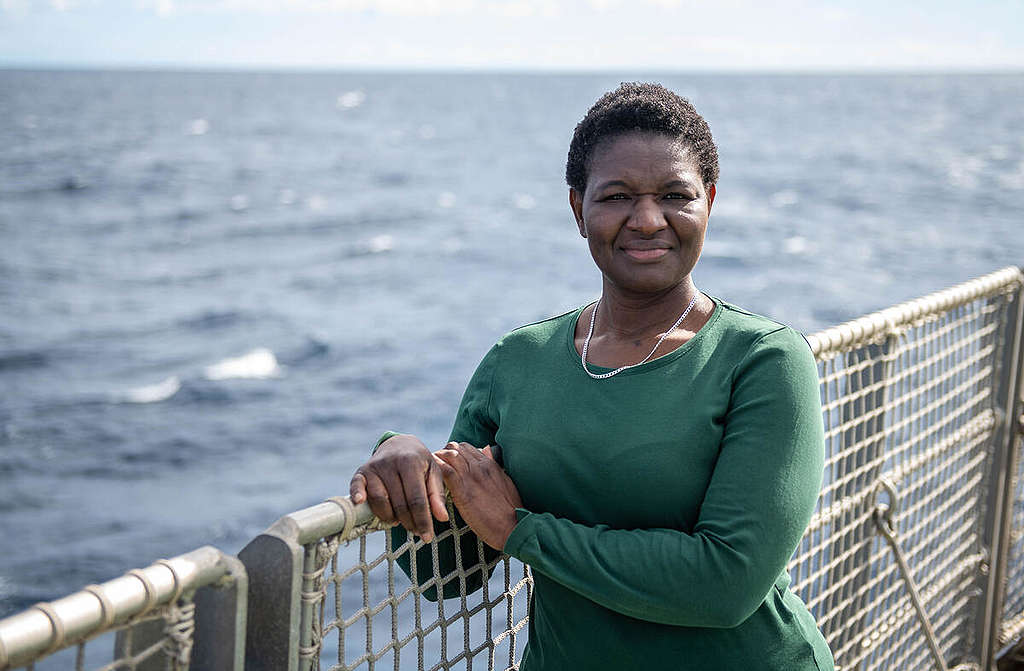 Victorine Che Thöner on board the Greenpeace Ship Arctic Sunrise. © Chris J Ratcliffe / Greenpeace
Victorine Che Thöner on board the Greenpeace Ship Arctic Sunrise. © Chris J Ratcliffe / GreenpeaceVictorine Che Thöner is a Senior Strategic Advisor at Greenpeace International. She has been part of the crew on board the Greenpeace International ship Arctic Sunrise, taking action against Shell as it heads for a major oil and gas field. Learn more about the action here.

 1 year ago
81
1 year ago
81


